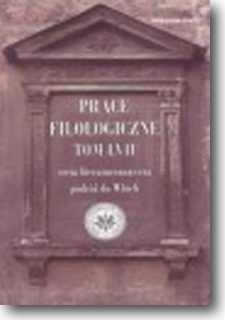Italia jako doświadczenie wzrokowe. Pochwała podróży i odkrywanie obrazów w poezji Zbigniewa Herberta
Italy as Visual Experience: Extolling Journey and Discovering Pictures in Zbigniew Herbert’s Poetry
Author(s): Robert CieślakSubject(s): Language and Literature Studies
Published by: Wydział Polonistyki Uniwersytetu Warszawskiego
Keywords: literatura polska; podróż; Włochy; Herbert; Polish literature; journey; Italy; Herbert
Summary/Abstract: Zbigniew Herbert’s work is characterized by various evidences of his journeys to the places of the origination and development of the Mediterranean culture in which European cultural heritage has been collected ever since. Unlike the former analyses of the poet’s work, this article discusses the significance of journey mainly in Herbert’s poems. The realization of {homo viator} topos in these poems suggests that, contrary to what he claims about the importance of artistic heritage present in the area, Herbert treats Italy, the subject matter of his work, primarily as a historical phenomenon, as opposed to other regions which he also uses as a poetic material such as Greece, France, or Holland. In the present article the author characterizes the methods of Herbert’s work on his journey notes (e.g. his reading list or ekphrasis exercises) emphasizing at the same time the poet’s perception of the journey as an obligation of personal contact with the “realness” of the world. This perception embraces the whole scale of sensual experience, visual in particular, which is decisive for Herbert’s aesthetics. The thesis of the visual experience being the dominant motif of the poet’s journey discourse has been exemplified by detailed analyses of Herbert’s poems, including “Obłoki nad Ferrara˛” (“Clouds over Ferrara”) from the poems collection entitled {Rovigo}. The author concludes that the “internal geography” of Herbert’s work is nonexistent without the books, knowledge and awareness constituting the poetic subject’s identity, or without history and memory. Similarly, from the point of view of aesthetics, Herbert’s man does not exist without religion. His journey can therefore be considered a sacrifice of both his own body and its sensual dispositions oriented towards learning about the world as complex legacy of numerous centuries, with its permanent representations, and as juxtaposed with the stereotypical, the average and the daily.
Journal: Prace Filologiczne
- Issue Year: 2009
- Issue No: 57
- Page Range: 237-256
- Page Count: 20
- Language: Polish

